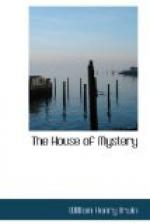Norcross looked up; his mustache lifted a little, and his eyes lit.
“Drink?” he said. His allowance was two drinks a day; one just before he left the office, the other before dinner.
“Much obliged,” responded Bulger, “but you know where I was last night. If I took a drink now, I would emit a pale, blue flame.”
Norcross laughed a purring laugh, and touched a bell. The secretary stood in the door; Norcross indicated, by an out-turned hand, the top of his desk. The secretary had hardly disappeared before the office-boy entered with a tray and glasses. Simultaneously a clerk, entering from another door as though by accident, swept up the balance sheets of the L.D. and M. and bore them away. Bulger’s glance followed the papers hungrily for a second; then turned back on Norcross, carefully mixing a Scotch highball.
As Norcross finished with the siphon, his eyes wandered downward again.
“Ever been about much down there?” he asked suddenly. Bulger crossed the room and looked down over his shoulder.
“Where?” he asked, “The Street or—”
“Trinity Churchyard.”
“Once I sang my little love lays there in the noon hour,” answered Bulger. “I was a gallant clerk and hers the fairest fingers that ever caressed a typewriter—” The intent attitude of Norcross, the fact that he neither turned nor smiled, checked Bulger. With the instinct of the courtier, he perceived that the wind lay in another tack. He racked the unused half of his mind for appropriate sentiments.
“Bully old graveyard,” he brought out; “lot’s of good people buried there.”
“Know any of the graves?”
“Only Alexander Hamilton’s. Everyone knows that.”
“That one—see—that marble shaft—not one of the old ones.”
“If you’re curious to know,” answered Bulger easily, “I’ll find out on my way down to-morrow. I suppose if you were to go and look, and the reporters were to see you meditating among the tombs, we’d have a scare head to-morrow and a drop of ten points in the market.” Bulger’s shift to a slight levity was premeditated; he was taking guard against overplaying his part.




